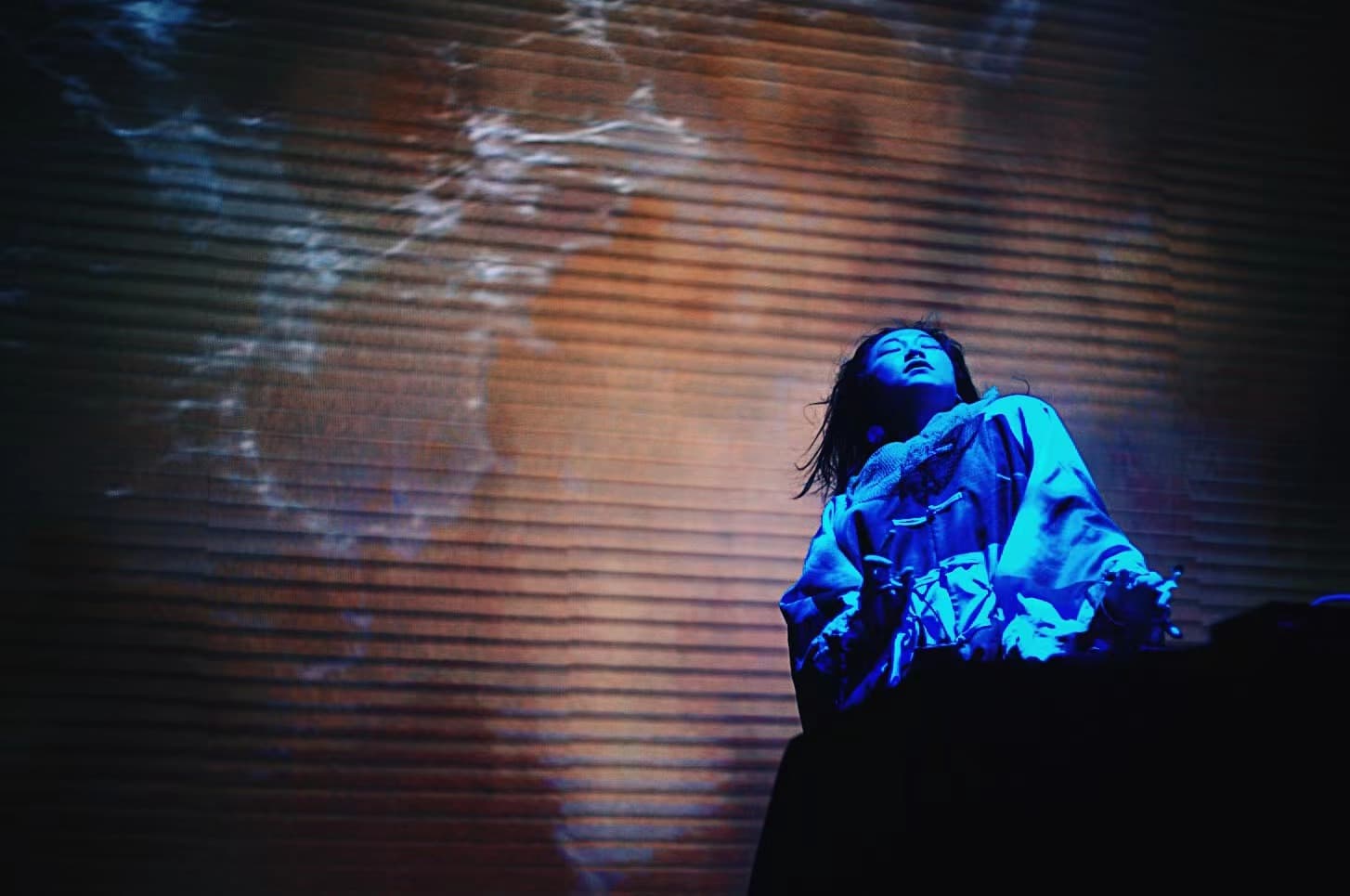
INTERVIEW: otay:onii
Photo: Vas
Born in Haining, China, otay:onii (Lane Shi) is a troubadour, performing musician, multidisciplinary installation artist, working sound designer and film composer who currently resides in New York. Electronic, ambient, sound collage or noise, otay:onii breaks down structures that chains her neck and feet, aiming to be free on the ride of acute instincts and establishing a bodily connection through the synchronisation of the heart and mind. She believes in echos, and “solving a puzzle with another puzzle that can’t be seen, be touched, but to feel”.
As well as being the vocalist of the punk spit band Elizabeth Colour Wheel, otay:onii released her solo debut Nag on ShadowTrash TapeGroup in 2018 and its follow-up Míng Míng on WV Sorcerer Productions in 2021. The music video for the latter’s closing track, “Un deciphered”, was an official selection by the Silicon Valley Asian Pacific Film Festival. Earlier this year, otay:onii announced that her third album Dream Hacker would be released on the 22nd of February, detailing the vivid dream which had inspired its creation:
“I was sleeping in my apartment in Shanghai, saw a kid throwing one rock onto another in a dream, and these two rocks overlapped a rectangular shape in the middle, and suddenly the rectangle part shredded a stream of piercing light, then I saw myself laying on bed, floating, on my ears or in the air was this whisper of a secret drifted like wings – ‘What connects you and me is the overlapping part.’”
Shortly ahead of the album’s release, Sidney Franklyn sat down with the artist to discuss the inspirations behind the new record as well as her recent “Un deciphered” music video.
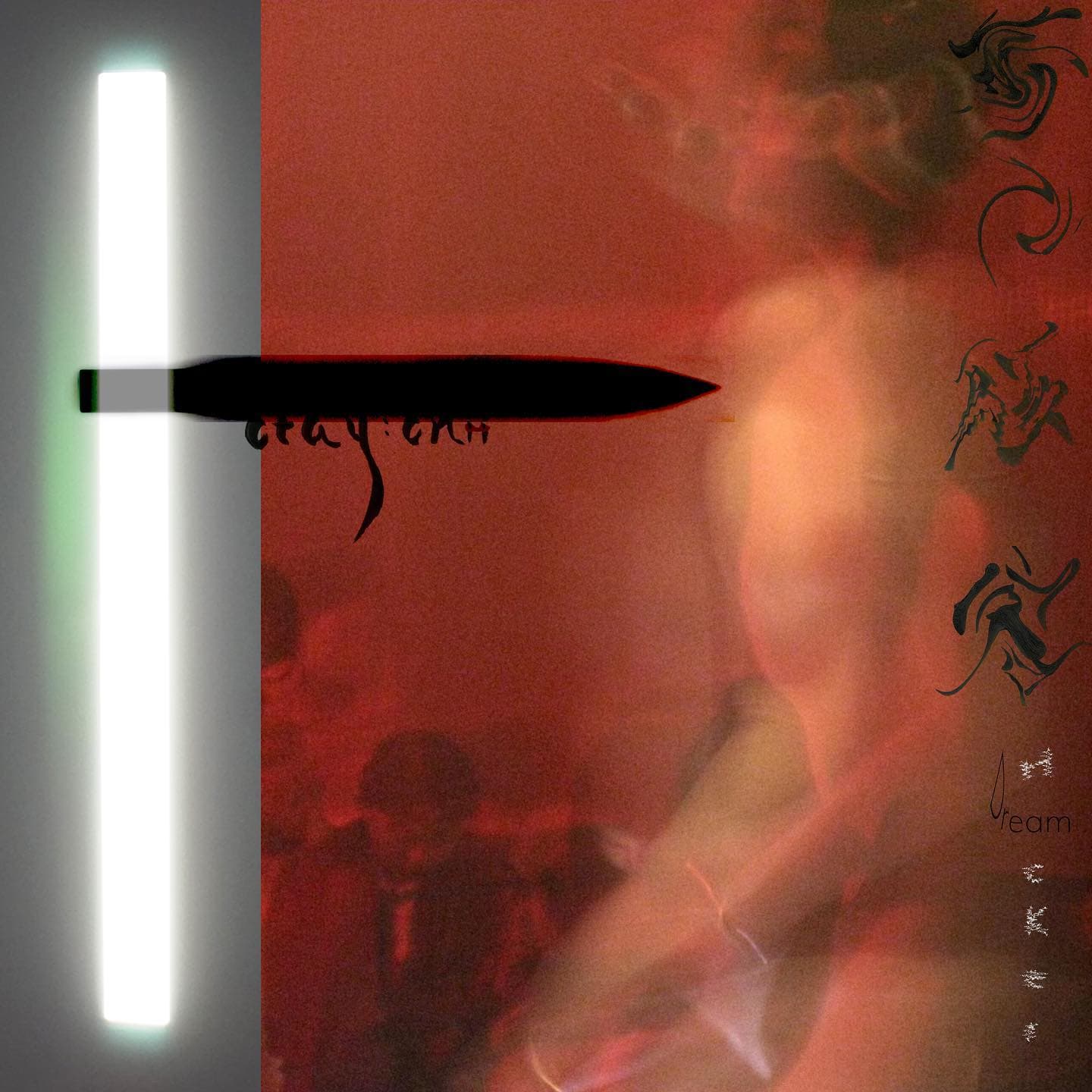
Sidney Franklyn: So you’re in New York at the minute, right?
otay:onii: Yeah, currently in New York.
SF: And you’ve been living there since last March?
oo: Yes. I had always been living in Boston but after eight years, I moved to New York for a year and a half. And during the pandemic, that’s when I felt that maybe it was best for me to go home. My mom had cirrhosis – it’s like liver function failures and stuff – and also the pandemic made it not super easy for me to live in New York. You felt like all the monsters, all the sinophobic sentiment just came out suddenly. So I went back to China for one and a half years, almost two. Coming back to New York in March… It’s a bit of an adjustment, because I mentally prepared myself for not coming back to the US at all due to uncertainty of my visa (green card denied twice previously). So yeah, I’m here. I’m thinking about moving forward for sure, moving out of the US.
SF: With any place in mind, or back to China?
oo: I like Berlin quite a lot, so possibly Berlin first and see what’s the possibility of staying. I had a really good experience spending two and half weeks there, it was wonderful.
SF: I love Berlin. What was the occasion?
oo: I was there for a program. I got to learn a bit of hacking, and also I had a show there. After the show, somebody invited me to do a presentation at UdK [Universität der Künste Berlin] for a class called ‘Generative Art’. It was quite cool, because I found out that a lot of people have an interest in Chinese cultural instruments, for example the Guqin, and one of the professors have some old Guqin textbooks and scores, truly amazing to look at because instead of scores, it explained the nature scenery with paintings in which the scores was composed. It was quite nice to chat a bit about their knowledge coming from Berlin, a Western country, and zooming into the Eastern world, in this case China and Chinese instruments. It’s nice – I haven’t encountered that kind of passion for foreign historical culture in the US unfortunately, culture in this kind of sense.
SF: If you don’t mind me asking, what made you return to the US?
oo: Because I have a band. [Elizabeth Colour Wheel]
SF: Yeah, of course!
oo: It’s all for the band. To be very honest, I love playing with my band, however it’s quite hard to continue living in this country, considering my experience in having very scarce resources for a musician like me in the US. Also creatively speaking, I think the solo stuff realises my brain juice and experiments with different mediums in full scope, as just a world that I’m creating and inviting guests (audiences) to visit. The band I see as a social construct involving collaboration with people from other cultures, which is necessary in my opinion.
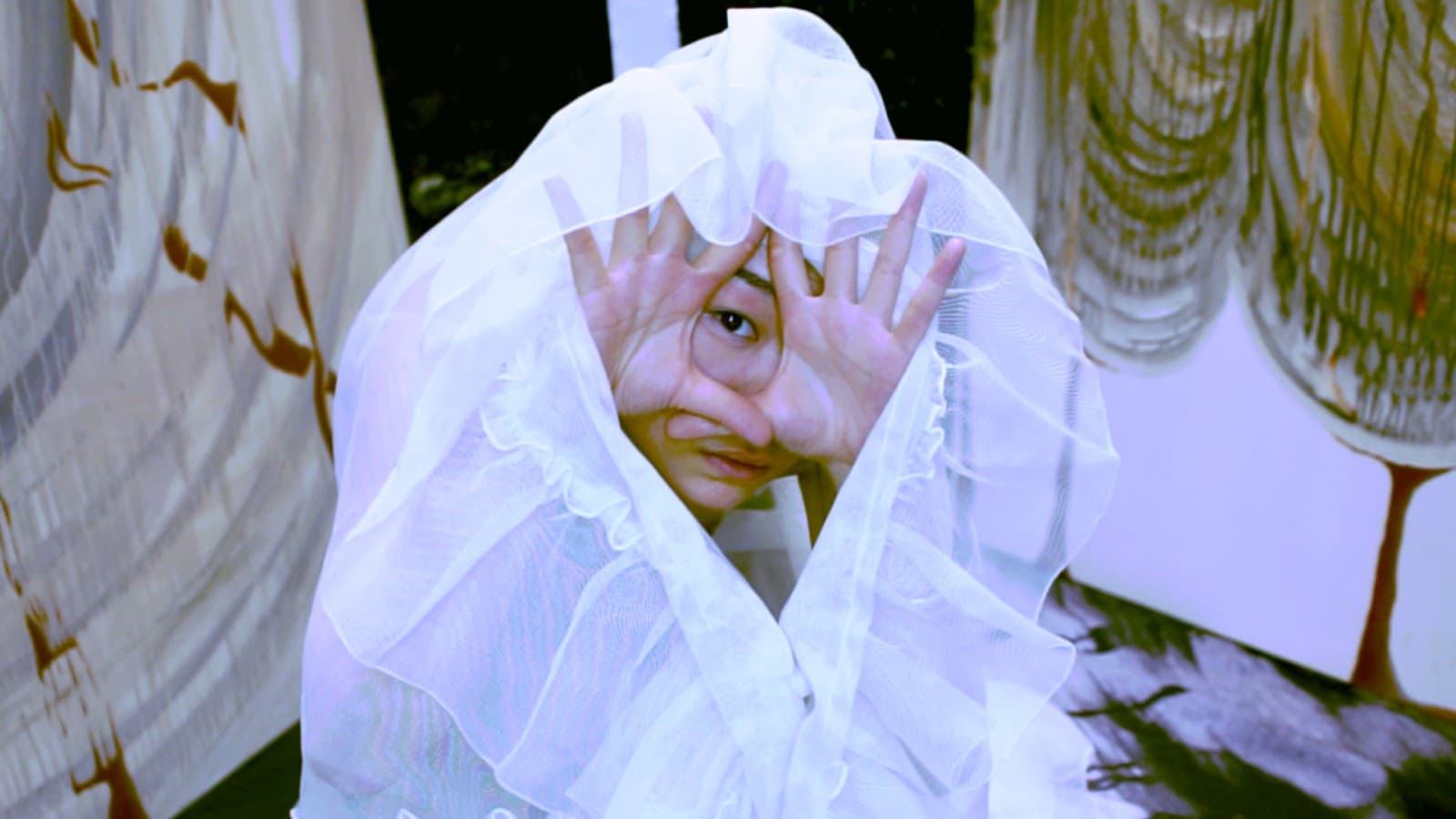
SF: For sure. So did the writing for Míng Míng overlap with your time in China at all? Or was it just the new album?
oo: Just the new album. Míng Míng was such an intense album, writing it when I was spending time in the US. I had a studio back then, and I did that album mainly in the studio in Ridgewood, New York.
MíngMíng 冥冥 by otay:onii
SF: So you had this time in China when you were working on Dream Hacker. It was around March when the music video came out for “Un deciphered” – was that something you were working on at the same time as Dream Hacker?
oo: Y_es, I think so. So the two albums are kind of a series, if you will, of art to elongate itself into existence. Talking about the music video for “Un deciphered”, it was a commissioned project for my friend for OCAT. However, they did not proceed to continue the project, but I had already contacted my friend and directors and all the people that would be involved. So I self-funded the project. It was quite intense._
We asked like 40 people to be involved as extras in the film, and they all hopped on the bus and transported themselves from Shanghai to Chongming Island on the outskirts. We ate and we quickly changed into our costumes in a restaurant, and when we went to the site, there were tons of mosquitoes. We were like a meat pack for the mosquitoes, because they were hungry for I don’t know how long. When we started shooting, nobody moved and nobody was trying to kill the mosquitoes. But when the director shouted out “Cut!”, you heard all these slapping sounds like “Pow pow pow pow!”.
It was quite moving because you know, these people just wanted to help and be involved in something that they enjoy doing. Some of them were my friends, and my friend, the director, was super on board. But some of them will never know me, they just happened to listen to my music and really want to be involved. So I think I was lucky to witness what people would do for strangers.
To pull off a project like this is really challenging for the kind of self funding route. It was very clear that it would not be a paid project and it would be all-volunteering, and people still wanted to be involved. That was something that I was very astonished and surprised by.
SF: The video itself is based around this rabbit deity, right, Éshòu. Where did the idea to incorporate that into the video come from?
oo: So, Éshòu comes from the southwest chapter of “Shényìjīng”, a documented mythological book. It is a beast that has a rabbit body and human face, who lies. But what that creature will say, always goes against her heart. So she will say, “Oh, go west”, but really what she meant was “Go east”. And if somebody eats one piece of her meat, that person will gain the ability to lie. The voyager was trying to survive in the midst of the woods and found this beast. After a dream discovering this beast’s secret, he saw a pack of beasts running towards him. But in the end, you could really see that the reason this beast was trying to run after him was because she wanted to give him a hug, not because of any retaliation.
The music video is up for interpretation, however I do have my own thoughts on it. The title is “Un deciphered” because for me (especially in the US) it’s interesting when people are really nice and open to expressing themselves, and it seems like we’re good friends, however it wasn’t really like that. When there’s some event that tests the hearts of people, you get to know what they really think of you, and what their reality conjuncts with yours.
I also wanted to try to echo this mythical creature that’s part of the lost culture in China. I have always been really interested in these creatures, but believe it or not, I think a lot of Chinese people are losing their culture quite a lot. They don’t know the old textbooks, they have no knowledge of things, not even to mention their lack of interest.
SF: You were talking about the imagery in that video, and one of the bits that I was really drawn to is when the hunter gets out the knife and kills Éshòu. In an interview you did a couple of years ago, you mentioned that when you were a kid, you didn’t like the area of Haining because of its association with the fur industry.
oo: Yeah, it’s a leather town.
SF: The imagery of this guy murdering an animal and then harvesting it – in the video’s case it’s the animal’s heart – it just brought to mind the act of hunting and skinning animals. I wondered if, on some level subconsciously, Haining might have inspired the imagery in your video.
oo: Yes. A lot of relatives of mine got involved in the fur and leather business from when they were young. It was quite a common thing when I’d walk around the factory full of ferrets for me to see my relatives get bitten on the finger, because the animals were just so angry. It’s why I think that to a certain degree, I am very tolerant to violence or to being exposed to violence. Instead of avoiding violence, I tend to dig out the secret within violence. I think it’s safe to say I’m influenced by it. It is the reason why the hunter cuts out a chunk of meat from Éshòu, and why I chose such a gruesome way to show this.
At the time, my friend gave me a vibrating egg. Obviously I wasn’t going to use it, so I used it for the music video, put it beneath the meat we were using for the scene where the pack of people were crawling on grass, and pushed the button so it started to vibrate, like the meat was fresh and still pumping. I’m very proud of that.
SF: Well, you’d never guess the origin of the movement watching the video.
~~~
oo: When I was young, I always thought of the apocalypse, and thought of many ways of escaping the planet. I don’t know how you feel when you’re on the toilet, but when I was young, that was when I would feel the most adrenaline to think of solutions. One day, I imagined a way to carry my parents and my grandparents away with a transportation. It was a bubble that had the ability to take people away without the influence of floods or thunder.
SF: You touched on something there which I was going to bring up later, which is the track “W.C.”. You were talking about feeling vulnerable on the toilet, and how it’s like one of the most vulnerable positions you can be in. I was reading the lyrics to the song, and how it has these visceral, and I guess kind of gruesome details about shit, and it reminded me of a short story by Bora Chung called The Head. I don’t know if you’ve ever heard of her?
oo: I might not have read it, but I will search for it.
SF: It’s about this woman, and at the start of the story all the sort of gristle and grime in the toilet calls out to her and calls her “mother”. She has unknowingly created this entity made out of all her waste, all the crap she’s thrown down the toilet. This entity calls out to her, but she’s horrified by it. She already feels vulnerable and terrified sitting on the toilet, and now there’s this thing in the drains that wants her affection, and is made up of all this shit and tampons and everything. She keeps ignoring it and ignoring it, and then this thing starts to create its own body, and out of all of her dead skin and all her hair, it makes a copy of her. When you’re singing about the shit in the toilet, and almost calling out to the listener, it really reminded me of this story.
oo: Great, I’ll check it out.
夢之駭客 Dream Hacker by otay:onii
SF: When you were talking about feeling vulnerable on the toilet, was that the place you were writing “W.C.” from?
oo: Yes. During the pandemic, the most visited place of mine was definitely the park. I noticed there were public toilets there, and one day I was taking a pee and noticed the Chinese public toilets were different to the US ones. It was just one big ditch of shit, and you just squatted down and pop whatever you need to pop. I saw all this gruesome shit pile up onto each other. Obviously, they’re from different people, so I thought of how vulnerable human relationships are, and how their shit piled together and dying together is potentially quite romantic. For the song’s music video, I shot one of my best friends and her partner kissing and being very intimate with each other. Slowly they grow apart in the video, and they take a shit, and their shit is actually intertwined, and grows into eternity.
This mechanism comes from my ideology of alchemy, the new era alchemy, which is turning shit into gold. I feel like there’s a lot of things that are not going according to plan, and there is a lot of bullshit that has happened. The constant shit, as you know, really challenged my psyche and nervous system. But I took it as a challenge to deal with the world, and therefore, I have gained more of an ability to face the world and gained more courage to move forward, rather than being stuck. I try to do alchemy on all the difficulties that come my way, and portray them as shit. Your shit, my shit – we all learn from it.
~~~
SF: When you were announcing the new album, you wrote this really beautiful summation of this dream you had that was the inspiration for the record. There’s several tracks in the tracklist – “Light Burst”, “Two Rocks a Bird” and “Overlap” – where I noticed they were all titles that related to specific parts of the dream: you have the piercing light that comes out of the overlapping stones, the stones themselves being the two rocks. Do you want to tell me more about how you realised these individual elements of the dream into songs on the album?
oo: So the dream was two rocks thrown on top of each other, and suddenly I saw the rectangular middle part which shined bright light. Then the next picture I saw during my dream was myself floating and looking down at myself laying on the bed. I heard a voice saying “What connects you and me is the overlapping part”, and in the dream it seemed so clear that the overlapping part between me and you is wherever there’s some momentum that rises up, our intention or our emotion overlaps, or we aim towards the same direction, so to speak.
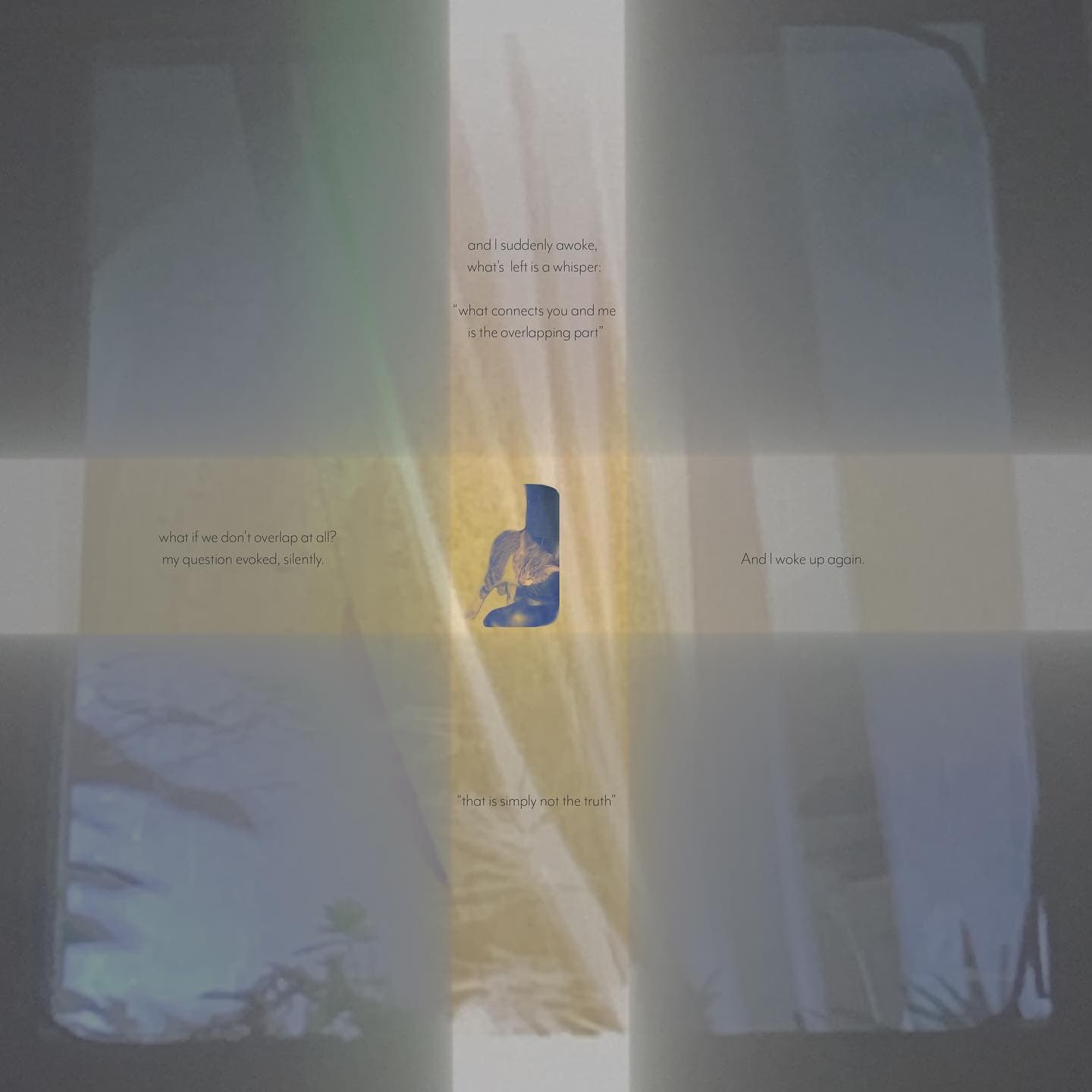
The first song, “You Do” is essentially dedicated to my father. I think me and my dad are really similar people, but we do fight a lot. I have this strong tension to really want to be close to him because I know that he suffered a lot trying to provide for the family. The older I get, the more I understand it. However, our interactions can’t necessarily glue us together. For example, he will be saying things like, “Hmm, I really wish I had a boy rather than a girl”, If he said this to me when I was 19, 18 – sure. But to hear that now is really harsh. However, I’m still trying to understand him, rather than when I was young when I would try to run away from him. So I take this overlapping part as my guidance to forgive – not to forget – but to forgive and understand people more. This has made my life much easier mentally.
~~~
oo: “Ritualware” is one of my favourite songs because I wrote the lyrics in very sincere way. Whenever people ask if I’m religious, I always tell them that I’m a religious atheist. I respect all the religions, and see religions have so many overlapping parts – they might as well be the same thing but told by different people standing in different positions and with different backgrounds. To see people fight with each other because they have certain political ties to their religion is ridiculous for me.
Here I wanted to point out the difference between religion vs. church. My uncle who lives in the US, he’s a really pious Christian I would say. I went over to his church, and people were appearing to be nice, but you never know with their thin veil of practised manners and indoctrinated cultures. In China, my grandparents were Christian and they would take me to church every Sunday when I was little. Grandpa died of cancer in a span of six months, during which each night we prayed as well as him. I always wonder if he still kept his loyalty to Christianity on the deathbed, because in the end religion is quite personal. The family prayed because of the care we had for grandpa rather than believing in God. With respect, the love itself was a manifesto that needs no judgement from anyone who would bring up the loyalty talk. Then it’s CHURCH. Belonging becomes PC. Exclusivity hints Controllability. All of this could be so simple in the realm of compassion. Between Great or Narrow it’s only a breath of love.
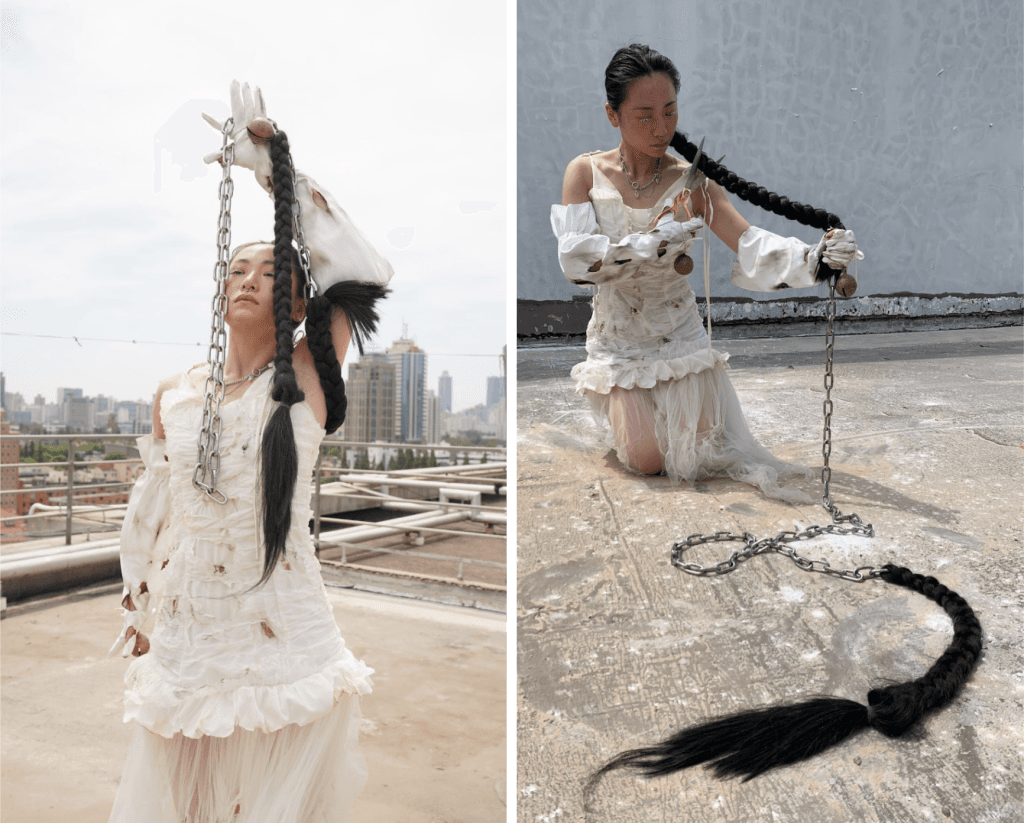
Photos: Cough In Vain
The last song is also a favourite. “Good Fool” definitely tries to bring everybody back to earth. You know, you’re still human so you might as well be a good fool. It talks about calculating things around you with your mind versus feeling everything with your heart. What I wanted to do at least, is to give people a vibe of surroundings and to put wings around people, and then try to float them away with the sound. I think that the dream will always be my guidance, and it has actually changed me quite a lot since it happened. I don’t know if I answered all of the questions that you asked, but I hope I did.
SF: No, absolutely. I think if I can ask one more question, do you have any kind of idea who or what the voice that whispered in your ear could be?
oo: It could be from an apparition from my past relatives, could be from many spirits that I brought home accidentally, or GOD, or some homeless person who left the words at my ear that I forgot and came back, could also be from myself as whatever subliminal information it needs to release as a coping mechanism? I don’t know who would claim it, and what’s the importance of that. But I do have stories to share.
When I first moved to the apartment in Shanghai, I had an operation because I was carrying stuff upstairs to the seventh floor without an elevator, like a heavy desk and everything. I had a cyst and I had to have an operation to get rid of it. My mom came along, and my mom brought the Bible with her, and put it on my shelf. And I would ask “Mom, you know you don’t believe in Christianity right?” She said “No no, I respect every religion”. She was like “I respect them even though I might not know them by heart, or understand each line. But I do know that I respect them”. Could respect mean belief? Many would tell me no. What you believe will lead you far.
I also went on a trip with a group of musical friends to Tibet, and we filmed ourselves stopping in whatever site we felt like, and starting to jam and improvise with the mountains surrounding us. When I left, one of the friends gave me a jade amulet, and when I got home, none of my things worked anymore. I had no hot water, and the cabinets kept falling out. I asked one of my friends to do an examination on the jade, and the jade broke the next day. Later I learnt from my friend that a spirit in the jade was trying to get out.
So many more, but I will leave it at that.
Dream Hacker will be released on bié records on the 22nd of February. You can pre-order the album on vinyl and stream the singles “W.C.” and “Overlap” via Bandcamp here.
夢之駭客 Dream Hacker by otay:onii
Back to home.